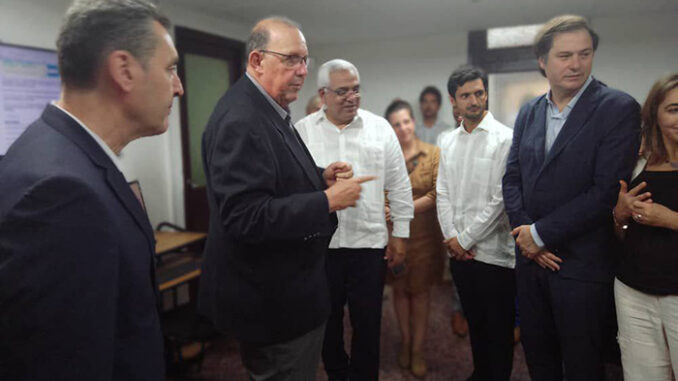
HAVANA, Cuba, Jul 7 (ACN) This week, the opening of the National Drug Observatory (OND) in Cuba was prominent in the media agenda,with the goal of contributing to the information and research needed to prevent and mitigate the incidence of this scourge in the country.
The body, responsible for monitoring trends associated with the trafficking and consumption of illicit drugs and other substances with similar effects in the Caribbean island, was officially established with a ceremonial ribbon-cutting ceremony at the headquarters of the Ministry of Justice.
This milestone marks a decisive step toward collecting and providing information to the public, thereby reinforcing the Cuban state's political will for surveillance, prevention, and response, as contemplated in the zero tolerance policy.
In a prior working session, Oscar Manuel Silvera Martinez, Minister of Justice, emphasized that this step is a normative reflection of the high priority Cuba places on the unity of all actors involved in the fight against drugs.
He specified that this moment is primarily rooted in the Caribbean nation's efforts to prevent the proliferation, trafficking, and consumption of illegal substances and to actively cooperate with global efforts to combat this problem.
The head of the sector also noted that the implementation of the observatory is based on three essential pillars: relieving the National Drug Directorate of certain functions regarding the monitoring of the phenomenon; facilitating public access to information and data on the subject; and, as a novel aspect, integrating the management of information, research, and early warning networks into its operations.
He emphasized that this corresponds to the growing international threat due to the increase in the production and trafficking of these substances, Cuba's geographical position relative to major smuggling routes, the emergence of new synthetic formulations, transnational organized crime, and the advancement of cover-up techniques.
Pablo Benitez Jimenez-Ugarte, in charge of Policy, Press, and Information at the European Union (EU) Delegation in Cuba, highlighted the observatory's potential, aligned with the approach of scientific evidence and information processing at the heart of public policy design for combating the problem, and how it will contribute to strengthening collective security and public health.
He also reiterated the European bloc's commitment to facilitating integration, promoting training in the field, strengthening research, and the EU's position as an ally in all efforts undertaken in this regard.
Regarding the impact of the scourge on Cuban society, particularly among young people, Dr. Carmen Borrego, head of the Mental Health Section of the Ministry of Public Health (MINSAP), highlighted the institution's strong commitment to the health of the population and to providing relevant tools for education and prevention.
Proof of this commitment to public health in the archipelago was the 103 Confidential Anti-Drug Hotline, a free, 24-hour national counseling service for drug cases.
In terms of raising awareness about the potential implications of substance use and enhancing risk perception, the participation of rehabilitated youth in community discussions in communities undergoing transformation was highlighted, becoming spokespersons for change by raising awareness among the population.
The opening was also attended by representatives from the Ministries of the Interior, the Ministry of Public Health (MINSAP), the National Drug Directorate, the Foundation for the Internationalization of Public Administrations (FIAP), and the Cooperation Program between Latin America and the European Union on Drug Control Policies, among others.
Cuba is a signatory to the three United Nations Conventions on this issue and maintains government collaboration agreements with more than 45 countries, as well as legal, civil, and criminal assistance agreements with more than fifty countries.
The Observatory is designed based on the interconnectivity of all social and institutional actors responsible for a comprehensive approach to the drug problem in the country, as well as the promotion of coordination with other international institutions to exchange good practices and strengthen operational capabilities.
Sidebar

 Agencia Cubana de Noticias
Líder en información nacional
Agencia Cubana de Noticias
Líder en información nacional








Nos reservamos el derecho de no publicar los comentario que incumplan con las normas de este sitio